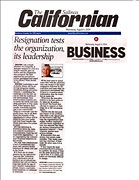Integrity Matters
August 4 , 2004
Resignation tests the organization,
its leadership

 Question: (E-127)
Question: (E-127)
Dear Jim:
I am a board member of a nonprofit. A manager resigned
in a bit of a temper tantrum, gave no notice, and the
resignation was accepted. She later regretted her precipitous
action, apologized and asked to be rehired. What should
we do?
 Response:
Response:
Leadership is and probably always will be an art that
integrates insight, sensitivity, timing and perseverance
-- combining the challenge to be the best we can be with
the realities of our shortcomings. Your board position
requires you to assess the values and operating principles
as they apply here. When tempers flare, usually something
happens that is not constructive. Yours is a corporate
(not-for-profit) issue, and in all likelihood, the integrity
of the organization's culture will be tested by how your
leader and your board handle this. Please keep these
five points in mind:
- If the individual is allowed to rejoin the team,
you could be considered a compassionate, forgiving
and supportive organization -- or an organization that
tolerates unprofessional behaviors by key people.
- You may even communicate a lack of professional
standards that sanction similar behaviors by others,
now and in the future.
- If there are no consequences for the destructive "tantrum-like" behaviors,
your organization sets in motion a set of cultural
permissions that will not lead to long-term health
for any of your valuable stakeholders: clients, donors,
employees, board members or community observers.
- You may want to spend some time with the executive
who was treated to the angry resignation followed by
the contrition and learn what circumstances precipitated
this. If there is a common-sense explanation, then
the board has an easier job. What does the executive
believe is the best action to be taken for all parties
involved? The board then chooses to support or challenge
his or her recommendation. Therein lies the real positive
impact of the problem: This crisis is the opportunity
for the board to help fine-tune the organization's
leadership. Further, employees will now know, regardless
of how you respond, that there are serious consequences
for immature behavior -- from whatever quarter such
actions emerge.
- Remember, first and always, that people make mistakes.
They under react and they overreact. If they make the error
once, it is a mistake.
If they repeat the same counterproductive action, it
is a pattern. Be aware. If they act the same destructive
way a third time, it is a habit, and habits are extremely
difficult to change.